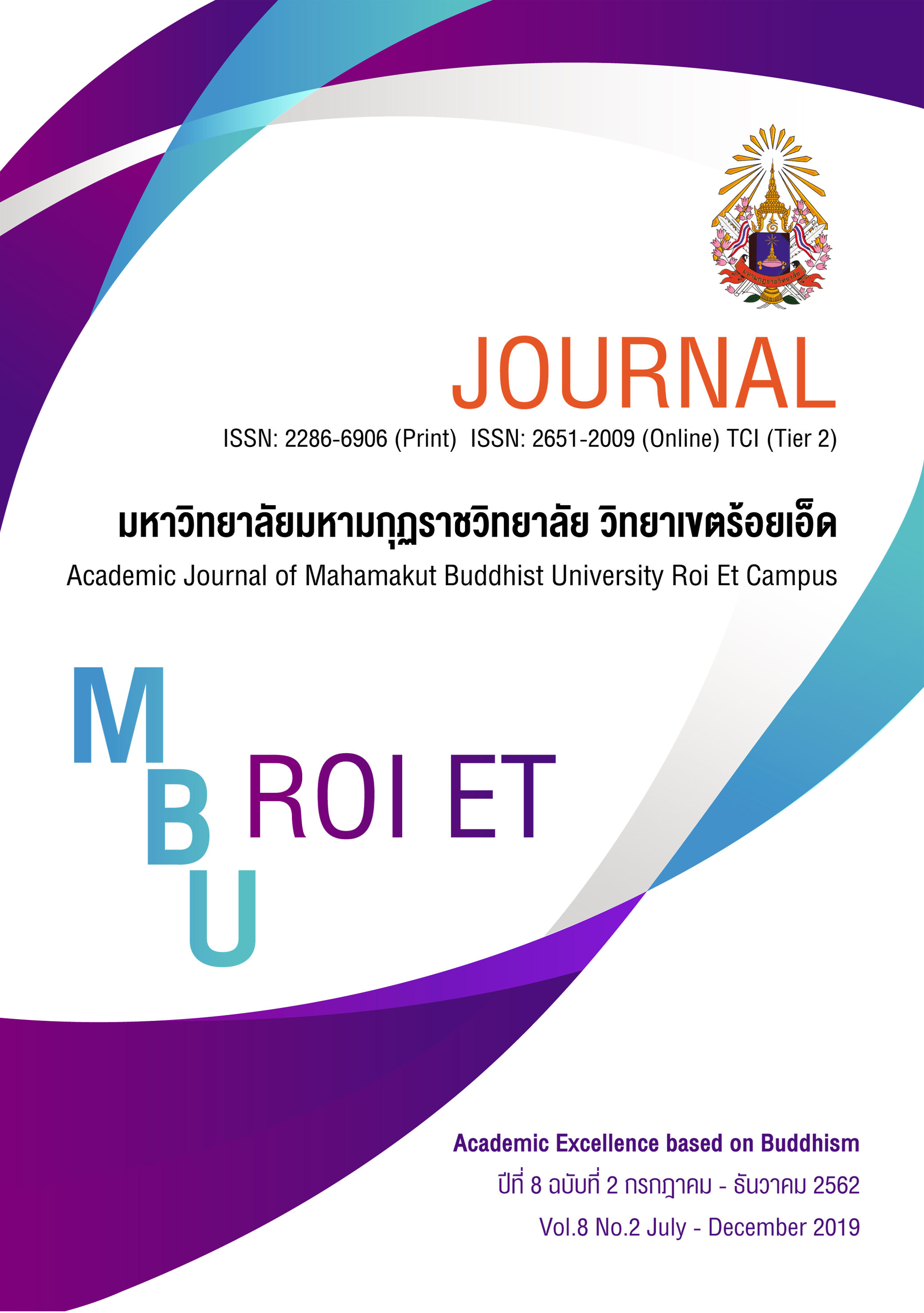Strengthening Central Northeastern Thais’ Motivation for Applying Five Precepts to Their Well-Being In Daily Life
Main Article Content
Abstract
The purposes of this research were: 1) to study Central Northeastern Thais’ motivation, 2) to find guidelines for strengthening their motivation ,and 3) to collect suggestions used as guidelines for strengthening central northeastern Thais’ motivation for applying five precepts to their well-being in daily life. The hypothesis laid in the fact that subjects with differences in individual factors distinctly applied five precepts to their well-being in daily life. The instrument used for data collection was the questionnaire. The sampling group comprised 329 subjects through stratified sampling, garnering it out of 980,633 populations as eligible voters inRoi Et province. Statistics used for processing data analyses from the questionnaires encompassed frequency, percentage, mean, standard deviation, t-test, and F-test (One-way ANOVA), setting the statistical significance level at .05.
Results of findings:
1. Central northeastern Thais’ overall motivation for applying five precepts to their well-being in daily life has been rated ‘high’.
2. Guidelines for strengthening their such motivation has been rated ‘high’.
3. The hypothesis testing results have found that subjects’ factors of genders, ages, occupations and educational levels bear significant differences in strengthening their such motivation, with the statistical significance level at .05. Regarding their factors of genders and ages used as guidelines for strengthening their such motivation, they show no differences in all five aspects in strengthening it. On the contrary, their factors of occupations and educational levels prove different, with the statistical significance level at .05.
4. Their guidelines for strengthening their such motivation in descending order of three frequencies are that; first, the society will deem more peaceful and happier if it is without stealing; second, if one wants another one to be sincere to oneself, so is either side; third, unless animals are killed, harmed and bullied, ones’ minds will be merry.
Article Details
References
สำนักงานคณะกรรมการพัฒนาการเศรษฐกิจและสังคมแห่งชาติ.(ม.ป.ป.). ยุทธศาสตร์การพัฒนาประเทศตามแผนพัฒนาเศรษฐกิจและสังคมแห่งชาติ ฉบับที่ 11 (พ.ศ. 2555-2559). กรุงเทพมหานคร : สำนักนายกรัฐมนตรี.
สำนักงานจังหวัดขอนแก่น. (ม.ป.ป.). แผนยุทธศาสตร์กลุ่มจังหวัดภาคตะวันออกเฉียงเหนือตอนกลาง ร้อยเอ็ด – ขอนแก่น – มหาสารคาม – กาฬสินธุ์ “กลุ่มร้อยแก่นสารสินธุ์”. สำนักบริหารยุทธศาสตร์กลุ่มจังหวัด “ร้อยแก่นสารสินธุ์” : สำนักงานจังหวัดขอนแก่น.
ปัทมา ผาดจันทึก และคณะ. (2551). พฤติกรรมการปฏิบัติตนตามศีล 5 ในชีวิตประจำวันของนักศึกษามหาวิทยาลัยเทคโนโลยีราชมงคลธัญบุรี. รายงานการวิจัย. คณะศิลปศาสตร์ : มหาวิทยาลัยเทคโนโลยีราชมงคลธัญบุรี.
วัฒนา วิไลสุทธิวงศ์. (2552). แนวทางการสร้างความผาสุกของบุคลากรเทศบาลเมืองเดชอุดม จังหวัดอุบลราชธานี. วิทยานิพนธ์ปริญญารัฐประศาสนศาสตรมหาบัณฑิต สาขาวิชาการปกครองท้องถิ่น. บัณฑิตวิทยาลัย : มหาวิทยาลัยขอนแก่น.
อธิษฐาน พูลศิลป์ศักดิ์กุล. (2549). การรักษาตามศีล 5 ของพุทธศาสนิกชนวัยแรงงาน กรณีศึกษาเขตสวนหลวง กรุงเทพมหานคร. วิทยานิพนธ์ปริญญารัฐประศาสนศาสตรมหาบัณฑิตสาขาวิชาการบริหารทั่วไป. บัณฑิตวิทยาลัย : มหาวิทยาลัยบูรพา.
อมร อำไพรุ่งเรือง.(2554).การศึกษาพฤติกรรมการรักษาและการล่วงละเมิดศีล 5 ของ
พุทธศาสนิกชน กรุงเทพมหานคร. วิทยานิพนธ์ปริญญาพุทธศาสตรมหาบัณฑิต สาขาวิชาพระพุทธศาสนา. บัณฑิตวิทยาลัย : มหาวิทยาลัยมหาจุฬาลงกรณราชวิทยาลัย.

